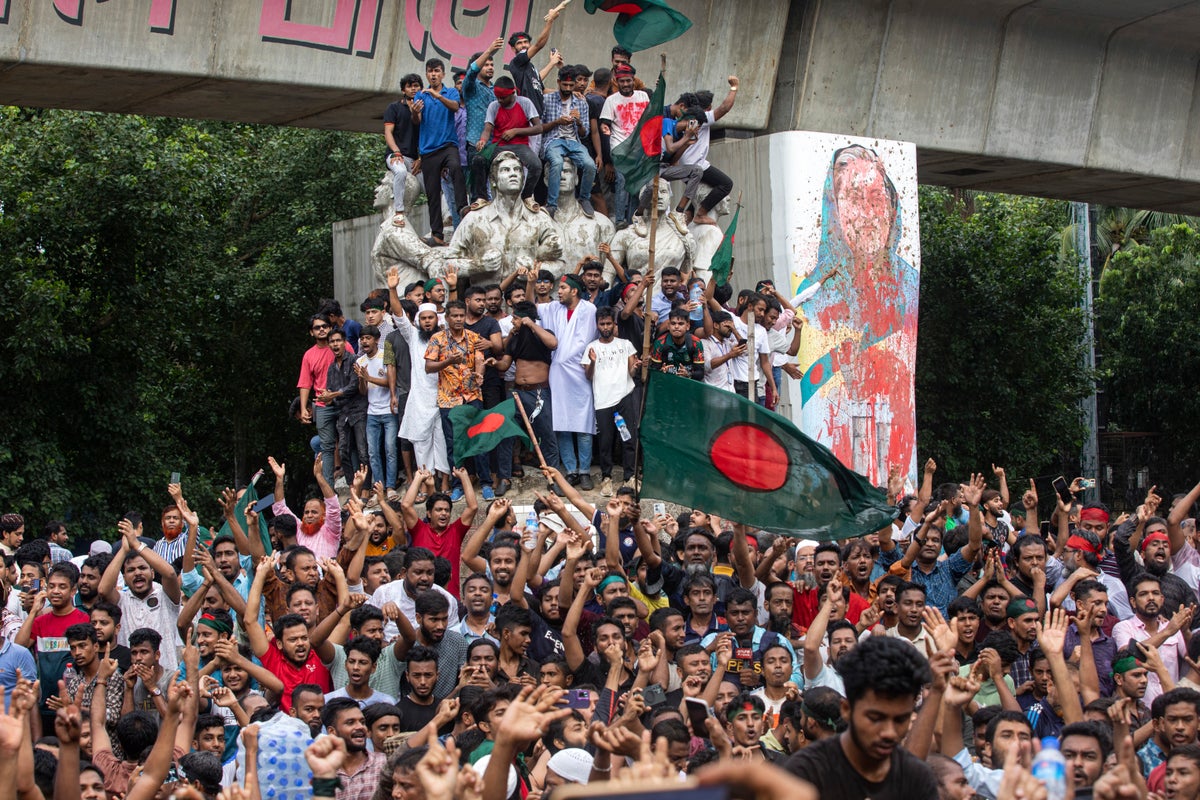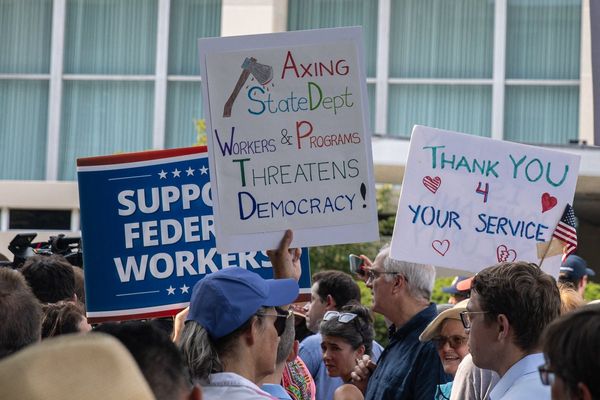
Support truly
independent journalism
Jubilation turned to anxiety in Bangladesh on Tuesday as the focus of student protesters turned to who should lead the country, now that authoritarian prime minister Sheikh Hasina has resigned and fled to neighbouring India.
Ms Hasina, 76, who had governed the country for more than two decades across four terms, dramatically stepped down on Monday afternoon after violent protests over a contentious job quota scheme swelled into a popular uprising.
The army chief who announced Ms Hasina’s resignation, General Waker-uz-Zaman, said the army would be involved in talks to form an interim government with president Mohammed Shahabuddin, who formally dissolved parliament on Tuesday afternoon.
But the coordinators of Students Against Discrimination, the main student body that led the protests starting in June, have said they will take to the streets again if a new government is formed without their input and with excessive inputs from the army.
In a video message, the student body called for Muhammad Yunus, a Nobel Peace Prize-winning economist and long-time critic of Ms Hasina, to be named as the chief adviser to any interim administration.
Nahid Islam, the organiser, said student protest leaders have already talked with Mr Yunus, who consented to take over considering the present situation of the country.
One protester, who did not want to be named for fear of reprisals from the security forces, told The Independent that they are now “worried for the future of Bangladesh” as they fear that the interim government could be hijacked by political opportunists.
“We are trying our best to maintain our sovereignty. We are worried that the government that would be formed would be right for us or not and currently the students’ coordinators are thinking about every possible member of that interim government,” she said on the phone from Dhaka.
“We are worried about the agendas and propaganda of some elements amid the political vacuum here. The students have taken up positions to protect minorities, after there were reports that some people of Hindu minorities have been attacked.”
Protesters are set to announce more names of people likely to be part of the government, Mr Islam said, warning that ignoring their choices would undermine support in any potential interim leader.
“We will not accept any other government except the government proposed by the students and people. We will not accept any military government, military-backed government or any B-team government formed with the associates of the fascists,” the student leaders warned.
Mr Yunus, 84, won the Nobel Peace Prize in 2006 after he pioneered a system of social outreach based on microlending. He has faced a number of corruption accusations and court cases under Ms Hasina’s rule, which his supporters described as a politically motivated vendetta designed to undermine his position as a potential rival.
In addition to the Nobel Peace Prize, he was honoured with numerous prestigious awards such as the US Presidential Medal of Freedom in 2009 and the Congressional Gold Medal in 2010. He also worked as chancellor of Glasgow Caledonian University in Scotland from 2012 to 2018.
Mr Yunus has called Ms Hasina’s resignation the country’s “second liberation day” and said Bangladesh was now a “free country” after her departure.
Ms Hasina’s exit has plunged the country into political instability after 15 years of one-party rule. The South Asian nation was already grappling with a series of crises such as high unemployment, corruption, communal violence and its extreme vulnerability to the climate crisis.
On Monday at least 135 people were killed as thousands of people marched to Dhaka to demand the resignation of the prime minister. Widespread arson, vandalism and rioting continued in the country overnight, taking the total death toll during the protests to well over 400.
Analysts have said the road ahead for Bangladesh will be long, and the unrest is likely to continue until a stable government is in place.
“[It] will be hard to focus on an interim government and political transition as long as the unrest and mayhem are not reined in. This is where the role of the army becomes significant. Intervening has its own risks, but it’s unclear who else can step in at this point,” Michael Kugelman of the Wilson Center, an American think tank, said.
The main opposition party, the Bangladesh Nationalist Party, on Tuesday urged people to exercise restraint in what it said was a “transitional moment on our democratic path”.
“It would defeat the spirit of the revolution that toppled the illegitimate and autocratic regime of Sheikh Hasina if people decide to take the law into their own hands without due process,” Tarique Rahman, the party’s acting chair, wrote on the social media platform X/Twitter.
After Ms Hasina’s ouster, protesters stormed into her residence where they set fires, carried out furniture, and took away raw fish and other fresh food from the refrigerators. They also gathered outside the parliament building, where a banner reading “justice” was hung.
And other crowds ransacked Ms Hasina’s family’s ancestral home-turned-museum where her father, Sheikh Mujibur Rahman – the country’s first president and independence leader – was assassinated. They torched major offices of the ruling party and two pro-government TV stations, forcing both to go off air.
Ms Hasina had by then arrived in neighbouring India, where the government says she is being allowed to stay “for the moment”. Indian media reported that she had applied for political asylum in Britain, though the UK government has played down the prospects of this being granted preemptively.
General Zaman said he was temporarily taking control of the country as soldiers tried to stem the growing unrest.
Mr Shahabuddin announced late Monday after meeting with General Zaman and opposition politicians that parliament would be dissolved and a national government would be formed as soon as possible, leading to fresh elections.
He also said that it was “unanimously decided” to immediately release the opposition Bangladesh Nationalist Party (BNP) chairperson and Hasina’s long-time nemesis, Begum Khaleda Zia.
Other political prisoners and detained protesters have also been released, with the president announcing that more would follow in the coming days.
The extent of the role of the military going forward is yet to be seen, but there is substantial precedence for the military taking active control of the government in the country. The country’s generals wield significant political influence in Bangladesh, which has faced more than 20 coups or coup attempts since its independence in 1971.







